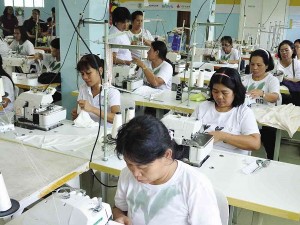
FABRIC OF HOPE The women of Towerville acquire a new skill and find a steady source of income in their new community, after losing their homes in Metro Manila because of disasters or demolitions. PHOTO BY SARA PACIA
For Rowena Osal, starting life anew in Towerville, a government relocation site in San Jose del Monte City in Bulacan province, goes beyond finding a new home.
“When we arrived here there were no houses, villages or anything,” said the 41-year-old woman who was uprooted from Marikina City in 2004. “I was thinking, ‘What will happen to our lives here?’”
Osal was among the hundreds of informal settlers in Metro Manila who were transferred to the low-cost housing project in Barangay Minuyan, some 12 kilometers north of Quezon City, after losing their homes because of floods or demolitions. Their new dwellings vary in size and shape, from shanties to concrete bungalows, but they were all built with the help of nongovernment organizations.
But more than housing, lack of income has been their main concern moving in. “Most of the people work in Manila and [stay in other houses], especially mothers who have to leave their children. It’s very difficult,” Osal said.
They are not exactly without lifelines. Since Towerville’s establishment, the government through the National Housing Authority (NHA) and several NGOs have offered job courses to the mothers for free.
But in 2010, the Center for Asian Mission for the Poor (CAMP) became the first to offer a program that went beyond standard training. It didn’t just teach job skills but went the extra mile to find them employment.
CAMP is a South Korean NGO working to improve the lives of the urban poor in the Philippines. Founded by Rev. Lee Chui Yong, the center has been helping communities not only in Bulacan but also in Manila, Malabon City and Cavite province.
Sewing center
In 2011, Osal and 39 other women were taught basic sewing and pattern making by CAMP. They later received skills training certificates from the Technical Education and Skills Development Authority (Tesda).
With the establishment of the CAMP Sewing Center, the first batch of training graduates was offered a partnership with the center to produce garments on a made-to-order basis.
Charisma Gascon, the center’s head coordinator, said the NGO aimed to teach the women not just how to make dresses but also establish a social enterprise in Towerville. “You have to be able to help the community as well,” Gascon said.
CAMP defines a social enterprise as a business run by the community to improve the living conditions of its residents, by providing sources of livelihood while caring for and giving back to the environment.
Before CAMP, Osal joined other training programs hosted by different NGOs, like those that taught women how to make bags from juice cartons and rags from cloth scraps.
“But after our training, they would just leave us. Their line of thinking was that because they already gave us the knowledge, it was up to us to use it [to get jobs],” Osal said. “It was difficult, especially if you do not have money to begin with.”
CAMP came into the picture in 2010, first by conducting surveys to select the training participants and the livelihood skills that could suit them best. Sewing emerged as the most “feasible,” Gascon said.
Hope replacing fears
Today, the CAMP Sewing Center supplies school uniforms for the barangay daycare center and South Korean clients. The shirts and bags are made from Korean fabrics and tarpaulins. Prices range from P100 for a shirt to P280 for a dress.
Only 20 women, including Osal, continue to work at the center. The pay may be still be small—a sewer makes around P150 a day—but it’s only the baby steps of what Gascon describes as a concrete example of a social enterprise, “a business of the people.” The rest of the center’s income goes to maintenance and supplies.
But what’s more valuable for Osal was that hope had replaced her fears, citing past experiences with other NGOs that practically left them alone. In hindsight, they may have even taken advantage of the women’s situation, she said.
“CAMP is not making money off us,” Osal said. “We’re the ones who should be thankful. They’re helping us by lending money to defray costs.”
“The livelihood we have now is not just about earning an income,” Osal said. “I’ve learned that attitude is the most important, your worth as a person. Just because you are poor, it doesn’t mean that you will sulk in one corner and stay there,” she said.
CAMP and its partner organizations have also held seminars and workshops on topics ranging from women’s rights to protecting the environment.
Beyond work
The NGO also facilitates a daily feeding program for the local daycare center, where some of the mothers leave their children while they work at the sewing center. It has also put up a bakery and health center in nearby Barangay Gaya-gaya.
Jinky Bareja, 33, and Ester Arendain, 26, are part of the second batch of CAMP trainees. Like the other relocated residents, both had difficulties finding work after moving to Towerville.
“If you live [in Metro Manila], life is relatively easy. It’s easier to earn money,” said Bareja, who used to earn P300 to P400 as a street vendor and at times eked out a living as a scavenger.
Bareja was initially skeptical about CAMP, until she heard Osal’s story. Now she looks forward to learning a new skill at the sewing center and augmenting her husband’s income as a vendor in Quezon City.
Arendain, who had joined many job courses and training programs in the past like Osal, also hopes to find something else besides work through CAMP: Values, insights and a sense of purpose that come with women empowerment.
“I want to learn more than just sewing. There’s a lot more that we can learn,” she said.